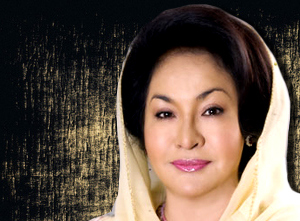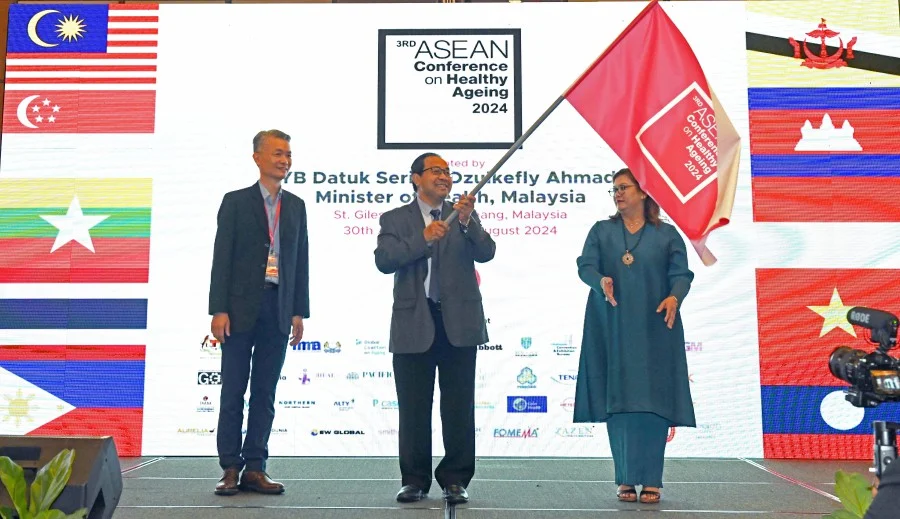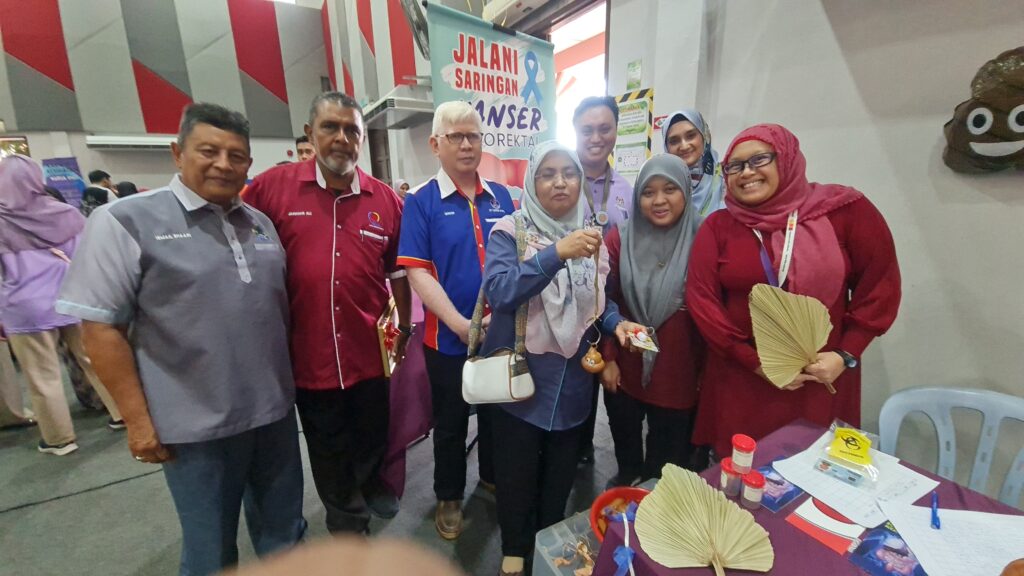
Bismillahirahmanirrahim
YB Datuk Rosnah Binti Haji Abdul Rashid Shirlin Deputy Minister of Health, Malaysia
YBhg. Prof. Nathan Vytialingam President of the Malaysian Healthy Ageing Society and Organising Chairman of the 1st World Congress on Healthy Ageing 2012 YBhg. Prof. Dr. Azhar bin Mohd. Zain Advisor, Malaysian Healthy Ageing Society and Chairman International Advisory Panel for the 1st World Congress on Healthy Ageing 2012 YBhg. Dr. John Beard Director, Department of Ageing and Life Course The World Health Organization
Distinguished Delegates and guests Members of the Media Ladies and gentlemen Assalamualaikum warahmatullahi wabarakatuh and a very good morning and salam 1Malaysia to everyone. 1. Thank you for inviting me to speak at this “First World Congress on Healthy Ageing”, the first ever conference of its kind in Malaysia, and jointly organised with the World Health Organisation. I understand that we have over 1000 delegates and speakers from over 30 countries who are gathered here today. This is a remarkable turnout and I commend all of you for being here at this important event. For those visiting Malaysia for the first time and also to our returning guests, allow me to bid you, “Selamat Datang” which means Welcome in the Malay language. I hope that during your visit you’ll enjoy our Malaysian hospitality, whilst taking in the sights and scenes that make Malaysia the perfect destination for work and leisure.
Ladies and Gentlemen, 2. The theme of holistic and healthy ageing is based on reality and practicality. It’s a far cry from the quest for elixirs for a deathless existence on earth. The mythical elixir of immortality was much written about throughout the ages, described in Greek mythology as ambrosia, in Chinese alchemical books as mercury, sulphur and precious substances such as jade, hematite and gold and also called Amrit in Hindu scriptures. Of course as it turned out, Chinese elixirs, far from contributing to longevity, were actively toxic, as evidenced by the deaths from mercury poisoning of emperors from many dynasties. Many experiments in the quest of immortality has in fact resulted in death or illness, when dubious concoctions and strange practices cause injury to those who try them. The fact of the matter is that while popular culture and entertainment glorify tales and legends of immortality and eternal youth, there is really, no such thing and the best we can do is learn to live well and age healthily and gracefully.
3. So it is good that we accept ageing as an inevitable process and start looking for ways to remain healthy and create the right conditions for positive ageing. We should ensure that older people are able to be active members of their society and live with dignity. Policy makers should bring the issue of healthy ageing and elderly people into the mainstream, taking them into consideration when developing key policies. 4. An Ageing Nation is one in which 15% or more of the country’s population is aged 60 years and above. I am told that the United Nations has projected the number of persons older than 60 years will more than triple, from 606 million today to nearly 2 billion by 2050. The number of persons over 80 years of age will increase even more, from 69 million in 2000 to 379 million in 2050, more than a five-fold increase. Malaysia, it is predicted will attain Ageing Nation Status by 2035 on the back of an increase in life expectancy arising from better healthcare and improved standards of living. 5. Coupled to the growth of an ageing population is the global phenomenon of falling fertility rates, in some countries down to very dismal levels. Obviously this has altered the demographics and population patterns. The same UN Report also predicted that by 2030, 85% of the world’s population will be in developing countries. In fact the percentage of the world’s population living in developed countries is declining, from 32% in 1950 to an expected 15% in 2030. The burden of care will increase when there is not enough younger people in the population. In wealthier regions, the drop in population is often balanced by the inflow of migrant workers. However, in poorer regions the impact of this demographic change is reflected in dying local communities. This is made worse by the lack of appropriate amenities for the old. 6. Because the growth of global ageing is a new and evolving phenomenon representing a significant challenge for us, we must be prepared with the right policies and practices to address them. In the case of Malaysia, it is forecasted that we would have more middle aged adults and elderly people in our population in the next 20 years. We need to start formulating their futures not least their roles in our society before they turn 60. We need to understand their impact on our socio-economic pattern, as an example.
Ladies and Gentlemen, 7. Modernisation is fast breaking down family units and the community structure. When in the past, most communities were made up of children and adults of childbearing ages with few elderly adults usually cared for by their extended families. Today, we have families with only one or two children. We are also witnessing the growing number of single parents in our societies. The once celebrated extended family units are now broken by geography and their only contact is via e-communications, if at all. In fact there are many cases where the elders in our societies are more dependent on the State than they are on their communities and their families.
8. In the era of the un-ending rat race, the notion of imbuing good values and building character of our children can simply get swept aside and the age-old value of filial piety and respect for one’s parents and elders can become completely eroded or lost. In addition parents have to contend with a great many modern distractions and social pressures influencing their children. We see examples of children from seemingly good parentage being caught up in acts of crime and moral decadence. Worse are the examples of children supposedly from good families and well off sometimes abandon their parents. Such instances form the tragedy of our times, and I highlight these examples to demonstrate that in today’s world for many people ageing can be a terrifying thought.
9. But ageing need not be seen to be always negative and dark. We need to move away from the notion of ill health, wrinkles and loneliness as an automatic inference when we speak of ageing. Many of us fear ageing for we fear that it may cost us our independence and our usefulness to society. While to a certain extent physical decline due to ageing may be inevitable, some dimensions such as knowledge and wisdom can perpetually grow and expand over time. There is a well known Greek proverb which says “A society grows great when old men plant trees whose shade they know they will never sit in”. This proverb in essence urges societies to include the old in building their future because the old bring insights and wisdom of cultural and societal conventions that only life’s experiences can provide.
Ladies and Gentlemen, 10. Given the changes in our modern society, growing old today is much more challenging if it is not complemented with good health. It is therefore imperative that we promote healthy ageing from an early age. Far too many of our young are involved in non beneficial activities which not only harm society but also cause lasting damage to their own health. We see young people indulge in risky road races and drug use which can simply snuff out their lives in an instant. We are witnessing young adults put themselves through relentless pressure in the race to succeed and consequently dying from sheer exhaustion or losing the hope to live. We also know of the many who live with complete disregard on how their lifestyle can impact their future health, not the least of which includes excessive drinking and unhealthy effects of sleep deprivation. Most of us over indulge in our prime years with the hope of shaping up in our retirement years with some new wonder drug, diet or whatever new health fad. We know that these simply do not work.
11. Medicine may have brought breakthrough discoveries which can cure infections and prevent diseases, stem cells theraphy is an example. But the greater effort lies in prevention, in better access to health care, hygiene, diet and nutrition, exercise and lifestyle choices. These are individual behaviours and environmental factors which can be modified. That responsibility, lies with all of us. We need to collectively do our part to foster the discipline and lifestyle that promote good health so as to ensure, we age gracefully. For instance, we must empower mothers to obtain good prenatal care, ensure their children receive unconditional love and adequate attention so that they grow up balanced physically, emotionally and spiritually.
12. Healthy individuals don’t just appear. They observe a disciplined lifestyle from an early age consistently. The idea that healthy ageing begins in later years is definitely a fallacy. Ageing begins at birth. Therefore, we need to think of healthy ageing from childhood. The task for us as parents, family members and leaders lie in how we influence people closest to us to observe a healthy lifestyle from an earlier age. This follows the adage, “An ounce of prevention is better than a pound of cure” attributed to Benjamin Franklin. Franklin, one of the founding fathers of the United States, lived to a ripe old age of 84 when his contemporaries had a life expectancy of only 34 years. He is said to have always practised what he preached to others.
Ladies and Gentlemen, 13. It was with the idea of prevention that I, together with many committed individuals embarked on the Early Childhood Education and Care or ECEC programme. We passionately believe that children are our most invaluable assets and our investment in them is our investment in the future of the nation. I am persuaded through the many known facts and examples around us that investing in health early, in a child’s development provides them with a better prospect in life as their dividends.
14. Young people today are facing challenges possibly never faced by generations before. We hear the plight of the many destroyed by socially destructive vices. Whilst intervention may arrest these destructive behaviours, they do not wholly eradicate the root problems that caused them in the first place. A more effective way to combat such social ills is to nurture our children from an early life – as early as, from birth.
15. The PERMATA Early Childhood Education and Care (ECEC) programme has been designed to provide special opportunities for children below the age of 5 from rural areas and disadvantaged children in semi urban areas. To date, there are more than 600 ECEC Centers all over the country, rolled out within a span of five years. The programme’s premise has been validated in many other countries including the UK, the United States, Australia and New Zealand.
16. The PERMATA curriculum was developed by adapting Good Practices used by the UK based Pen Green Centre as a guide. Emphasis is placed on “fun learning through playing”, which is a method of learning based on children’s natural inclination to explore their world through play and imagination. Permata has adopted the theme ‘Every Child is Precious’ to emphasize its seriousness to develop a holistic, quality and seamless early childhood education and care which includes health care and proper nutrition. These elements are reflected in the National Early Childhood Education and Care Policy.
17. With regards to health, I have always emphasised that every child registered in the PERMATA Centers must have a healthcard. We started this discipline by ensuring children under the Permata programme undergo health screening twice a year at government clinics for early detection of any health issues. Today, we have several private hospitals offering health screening to nearby Permata centres. These private hospitals complement government clinics and they do so as part of their corporate social responsibility. We found health screening for the young to be very effective. For instance we detected early hearing deficiencies and were able to provide immediate treatment for the children involved.
18. While focussing on prevention starting from early childhood, we must not forget that there are older people now living with the effects of how they lived when they were younger. The main reason for retiring prematurely, for instance, is poor health in middle age and a lack of planning to get the right fit between individuals and their work as they age. We must promote work life balance to ensure people are not overworked at the expense of their health. Apart from healthcare, we need to ensure workplaces promote healthy lifestyles. This include policies and practices such as no smoking, flexi-time which encourages work-life balance, welfare, recreation and exercise fascilities and opportunities to advance through life-long learning. Ladies and Gentlemen, 19. Mark Twain is famed to have said and I quote, “The only way to keep your health is to eat what you don’t want, drink what you don’t like, and do what you’d rather not.” Many of the things that will keep us fit and active like exercise and eating healthy may not be fun or easy to do. But do it we must, because it is our best shot at a comfortable, and meaningful autumn of our lives, still being able to do and enjoy the things we love almost the same way we did, when we were younger. Our health investments in our youth will see its rightful yields when we grow older. How well we age is not measured in how wealthy we are, but rather in how healthy we stay and how enthusiastically we embrace life.
20. In addition to this, we must honour the old and the elderly in our societies. They should not be put aside when they reach a certain age. Where possible they must be given an opportunity to contribute meaningfully to society. This would particularly promote motivation and positive attitude amongst the elderly in our society which would have a direct positive impact on their health. 21. It is my deepest hope that we continue to appreciate and cherish our elders, and that we perpetuate this culture by nurturing our young from an early age. Let us ensure that these children will grow up to be physically, emotionally, and spiritually healthy adults with the right set of values, positive attitude towards life, and ability to manage stress. A centenarian once said “If I’d known I was going to live this long, I’d have taken better care of myself”. I’m sure many of us can relate, wishing we knew when we were younger the things we know today, which could have made our lives all that much better. But we can still convey this valuable piece of wisdom to our young, so that they can begin ageing well, even in their youth. 22. Permit me to take this opportunity to thank the Organisers once again for the opportunity to share my thoughts with you. I wish all of you a fruitful and beneficial conference.
23. On that note, it is my pleasure to officially launch the “1st World Congress On Healthy Ageing”. Wabillahi taufik walhidayah wassalamualaikum warahmatullahi wabarakatuh. Thank you.






